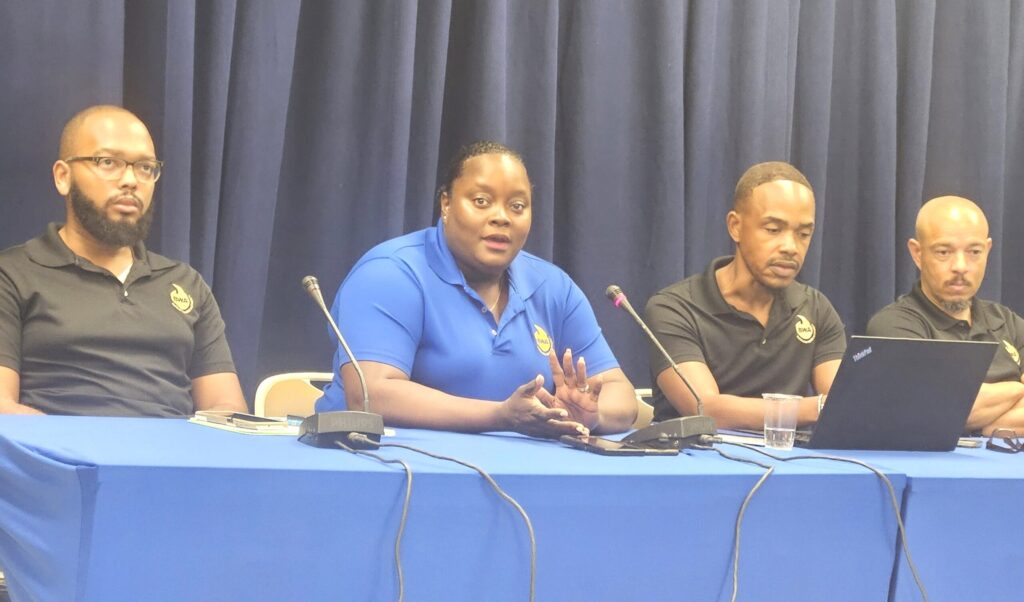Young people from across Barbados recently placed resilience financing at the centre of national discussions, as they joined government leaders and international partners in a special National Youth Platform to mark International Day for Disaster Risk Reduction on October 13.
Under the global theme Fund resilience, not disasters, participants underscored the urgent need to increase investments that protect communities from climate and disaster risks.
Throughout the morning, youth leaders highlighted how disasters disrupt education, livelihoods and well-being, but also demonstrated the creativity and innovation they bring to resilience building. Interactive “resilience labs” gave young participants space to exchange solutions – from climate-smart technologies to community-driven approaches – showing that youth are not only vulnerable to hazards but active agents of change.
This year’s theme calls for a decisive shift: from spending vast sums on disaster response and recovery to investing proactively in measures that reduce risks before disasters strike. For Small Island Developing States such as Barbados, where hurricanes, flooding and other coastal hazards pose an existential threat, financing resilience is both a necessity and a smart investment in sustainable development.
Opening the event, Captain Robert Harewood, Deputy Director of the Department of Emergency Management, stressed that engaging youth in national resilience planning is key to ensuring a safer future for Barbados.
United Nations Resident Coordinator Simon Springett called for closer intergenerational dialogue so that youth priorities feed directly into policy and financing decisions, shaping innovative responses to challenges that affect their present and future.
“This initiative, supported by several key partners, is both timely and essential,” Springett said. “No single entity can tackle these challenges alone. We must strengthen our collective response to enhance the resilience of our region. The National Youth Platform contributes to these efforts.”
Saskia Carusi, deputy chief of the United Nations Office for Disaster Risk Reduction, regional office for the Americas and the Caribbean, added, “Countries, rich and poor, are facing disasters that are larger and more destructive. This is partially driven by an increase in extreme weather events, but it is also driven by risk-blind investments, which increase the exposure and vulnerability of people and assets.”
The Government of Barbados also reaffirmed its commitment to building resilience. Minister of Home Affairs and Information, Wilfred Abrahams emphasised that investing in resilience is not an expense but a necessity for sustainable development.
“Every dollar spent on resilience saves many more in recovery. Investing in resilient infrastructure, early warning systems, and community preparedness is not a cost — it is a safeguard for the future,” he said. “The global community must shift financing from reaction to prevention, from disaster relief to resilience-building. For Small Island Developing States, this shift is not a luxury; it is the difference between vulnerability and viability.”
The event also featured a youth-led panel discussion on the theme Fund Resilience, Not Disasters – A Youth Perspective. The panel brought together young leaders from Barbados and across the Caribbean to explore how youth innovation, financing and partnerships can drive greater investment in resilience. Participants discussed the importance of risk-informed public and private investments, collaboration across sectors, and ensuring that young voices shape the decisions that affect their present and future.
UNICEF Youth Advocate for the Environment, Maria Marshall highlighted that young people should not be seen merely as victims of disasters but as powerful agents of change.
“To assume we are just victims would be unfair and untrue. Young people can be powerful agents of change. Involving young people in disaster planning could be constructive,” she said.
She added that “the youth bring fresh ideas, energy, and local knowledge that is integral to their experiences and would improve community resilience”.
A highlight of the platform was the official launch of the World Tsunami Awareness Day 2025 Film Festival, which will take place in November. The festival aims to raise awareness of tsunami hazards in the Caribbean and promote preparedness through film and community engagement.
By the close of the event, youth participants presented key recommendations to strengthen national and regional resilience strategies. They were encouraged to drive innovation in disaster risk reduction and to ensure their voices are firmly represented in national platforms and decision-making.
(PR)
The post Young Barbadians champion resilience financing appeared first on Barbados Today.


